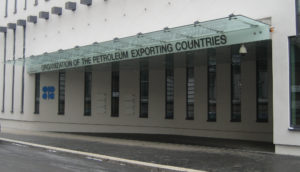Oil Production Threatens Stability
In efforts to undermine each other, major oil e xporters continue to pump as much oil as possible, increasing the glut of oil in the world market and sending prices downwards. Despite talks of lowering production to around 32.5 million barrels per day, member states of OPEC such as Iran, Iraq, and Nigeria refuse to cut production because non-members including Russia, Canada, and the United States are increasing production. This race to the bottom, which has been going on for over two years, currently appears to be unsolvable and promises to wreak havoc across the globe. Countries around the world from Latin America to East Asia are suffering from loss of revenue, encouraging protests, political turmoil, and economic collapse. Where will oil take the world? Will the lucrative black gold drag economies, governments, and nations down in its never-ending freefall?
When the global oil market collapsed in 2014, Venezuela and Russia faced massive repercussions. Over 50 percent of their exports were oil, resulting in economic contraction, unprecedented inflation, and political protest. Two years later, Rosneft still weathers massive profit losses, and President Maduro of Venezuela urges OPEC countries to agree to cutting oil production, a desperate push to salvage his country. PetroChina, Exxon Mobil, and Total SA, some of the largest corporations in the world, took huge losses this quarter as well. While the challenges of major oil companies cause concern, the oil crisis itself holds political implications that could change international relations for years to come.
xporters continue to pump as much oil as possible, increasing the glut of oil in the world market and sending prices downwards. Despite talks of lowering production to around 32.5 million barrels per day, member states of OPEC such as Iran, Iraq, and Nigeria refuse to cut production because non-members including Russia, Canada, and the United States are increasing production. This race to the bottom, which has been going on for over two years, currently appears to be unsolvable and promises to wreak havoc across the globe. Countries around the world from Latin America to East Asia are suffering from loss of revenue, encouraging protests, political turmoil, and economic collapse. Where will oil take the world? Will the lucrative black gold drag economies, governments, and nations down in its never-ending freefall?
When the global oil market collapsed in 2014, Venezuela and Russia faced massive repercussions. Over 50 percent of their exports were oil, resulting in economic contraction, unprecedented inflation, and political protest. Two years later, Rosneft still weathers massive profit losses, and President Maduro of Venezuela urges OPEC countries to agree to cutting oil production, a desperate push to salvage his country. PetroChina, Exxon Mobil, and Total SA, some of the largest corporations in the world, took huge losses this quarter as well. While the challenges of major oil companies cause concern, the oil crisis itself holds political implications that could change international relations for years to come.
In an attempt to run American shale out of business, OPEC flooded the market with oil in 2014, which lowered prices and made shale drilling unprofitable. Now, the cartel cannot make a comprehensive agreement to cut oil production, as distrust and rivalries push members to keep pumping in attempts to gain an edge over one another. Demand for oil is also predicted to decrease in the future as renewable energy becomes increasingly popular and companies abandon fossil fuels. For these reasons, the oil-wealthy nations are determined to make as much profit as possible before oil becomes irrelevant.
Oil nations, as Saudi Deputy Crown Prince Mohammed bin Salman said, have a “dangerous addiction to oil.” Their economies and often their political structures are completely dependent on oil exports. The monarchy of Saudi Arabia already hangs on a thread, susceptible to popular uprising due to the oppressive nature of the administration. Venezuela has been experiencing protests since 2014. Putin’s popularity rests on economic success, but the drop in oil prices has compromised this, prompting him to distract the populace by intervening in foreign nations. If oil money stops funding these nations, they will collapse and the international community will feel the repercussions.
The international community must focus on the futures of these one-dimensional nations. A destabilized Russia, Saudi Arabia, or Venezuela will have unforeseen side effects on international politics. Most of these countries did not follow a traditional path to wealth, becoming rich quickly by finding oil instead of transitioning through a period of industrializing and services. If oil fails these countries too quickly, they will be left with no revenue, no experience, and no future. OPEC and other oil-producing nations like the United States and Canada must agree to stop undermining each other. These two years have taken a toll on the oil oligarchs, and prices must bounce back in order to ensure international stability. The international community needs time to plan for a future independent of oil; stabilizing the oil-producing nations proves vital to the long-term success of the global order.
 Nabil is a freshman in the School of Foreign Service from San Antonio, Texas. He one day hopes to live his life among snow leopards in the forests of the North.
Nabil is a freshman in the School of Foreign Service from San Antonio, Texas. He one day hopes to live his life among snow leopards in the forests of the North.
